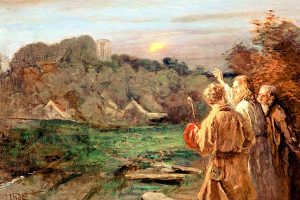Readings (Year A):
Numbers 6:22 – 27
Psalms 67:2 – 3, 5, 6, 8
Galatians 4:4 – 7
Luke 2:16 – 21
Reflection: May Jesus be born through us today
Today is the eighth day of Christmas, the day on which we celebrate the Solemnity of Mary. Since I did not grow up Catholic, this phrase—the Solemnity of Mary—brings to my mind a picture of a very sober, serious, and unsmiling Mary. I’ve had to do a little research to discover exactly what “solemnity” means in this context. I found out the original meaning of the word solemn had to do with a religious ceremony. This medieval word came from even older language roots, though, carrying the sense of something that is whole, safe, and stable.
So, today, we again celebrate the meaning of Christmas, just as we did on December 25th—except today we focus on the role Mary plays. Through Mary, God entered our world in the form of flesh and blood. And today, we too are invited to share the security and abundant well-being of Mary’s motherhood. This is the Solemnity of Mary!
As I said, I didn’t grow up Catholic, so Mary and I weren’t well-acquainted. Then, in a college lit class, we studied Gerard Manley Hopkins’ poem, “The Blessed Virgin Compared to the Air We Breathe”—and I caught my first glimpse of Mary’s ongoing spiritual work.
Wild air, world-mothering air,
Nestling me everywhere, . . .
Minds me in many ways
Of her who not only
Gave God’s infinity
Dwindled to infancy
Welcome in womb and breast,
Birth, milk, and all the rest
But mothers each new grace
That does now reach our race.
Gerard Manley Hopkins (like me) was raised by deeply spiritual Protestants. His upbringing set him on a trajectory that led to his conversion to Catholicism, and from there to his becoming a Jesuit priest. At the time, he was already gaining reputation as a poet, but he burned his poems and stopped writing for the next seven years. “On this day,” he wrote in his journal, “I resolved to give up all beauty until I had [God’s] leave for it.”
Eventually, however, Hopkins learned what our scripture readings today make so clear: we are called to share joy and beauty with others. And as we do so, Mary continues, through us, to birth God’s grace into our world. She is as ever-present and essential as the air we breathe.
In today’s first reading, from the book of Numbers, God tells us we are called to bless the people around us. Each interaction is an opportunity for God’s face to shine, an opening for divine peace to enter our experience.
Then, in the psalm, we hear more about blessing, but this time, it is God who is blessing us. The Hebrew words meant, literally, that God kneels to us in adoration. The creator of the universe honors our human beauty and creativity. This does not make us egocentric or arrogant, as Hopkins sought to avoid when he renounced his poetry. Instead, as God uses us to bring divine blessing into the world, we find our true purpose.
Finally, in today’s reading from Galatians and then in the gospel reading, we connect directly to Mary’s story. The spirit of Jesus is born in our own hearts, and like the shepherds, we too glorify and praise God; we bless others by sharing this amazing connection to God. In the words of Gerard Manley Hopkins, the work of Mary makes
New Nazareths in us,
Where she shall yet conceive
Him, morning, noon, and eve;
New Bethlems, and he born
There, evening, noon, and morn.
May Jesus be born through us into our world, today—and every day throughout the year.













Add comment